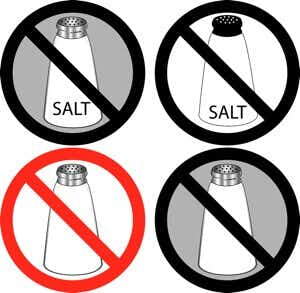
When it comes to a healthful diet, we are constantly exhorted to eat less overall, avoid sugary beverages, shun fat (especially sat fat) and stick to a low-sodium diet. Perhaps the simplest way to summarize this advice would be to say stay away from fast food when eating out and don’t buy highly processed foods at the supermarket.
The Downside of a Low-Sodium Diet:
But that isn’t always the way this advice is framed. Sometimes when people are told to focus on just one component, like sodium, they do a really good job-so good that they may endanger their well-being. We heard about this from one healthcare provider:
Low-Sodium Emergencies:
Q. Extremely compliant people who have been scrupulously following a low-sodium diet sometimes come into our emergency department with neurological changes. Their families are worried that they are having a stroke but our testing shows that they have a low sodium level. These people are almost always admitted to the hospital to follow their sodium and neurological recovery.
Will This Undermine People’s Trust in Doctors’ Recommendations?
This is a waste of healthcare resources as well as a strain on patients’ time, money and emotional energy. More critically, if following doctor’s orders leads a person to be hospitalized, he or she might question other types of doctor’s orders such as, “Do I really need this prescription for heart medicine?”
A. The American diet contains a lot of processed foods that are high in sodium, so doctors often advise people to consume less salt. The American Heart Association recommends that all Americans strive to get less than 1,500 mg of sodium daily (about 2/3 of a teaspoon of salt). New dietary guidelines for Americans also emphasize the importance of reducing sodium.
Hyponatremia and Heart Failure:
People who follow this recommendation very stringently may actually end up with too little sodium in their system (hyponatremia). Symptoms can include headache, confusion, fatigue, muscle weakness and nausea.
People with heart failure often have the necessity of a low-sodium diet impressed upon them. However, a new study shows that people with heart failure may have more complications if their sodium levels fall too low (JACC Heart Failure, Jan. 2016). This suggests that dietary recommendations from physicians may need to be more nuanced and better tailored to individual patients’ situations.
To read more about potentially serious complications of a very low-salt diet check out this link. You may be surprised to learn that achieving optimum sodium balance is a bit like the story of Goldilocks and the porridge…not too hot or too cold. For sodium…not too high or too low! Here is another person who also experienced low sodium levels to the point of hyponatremia.

